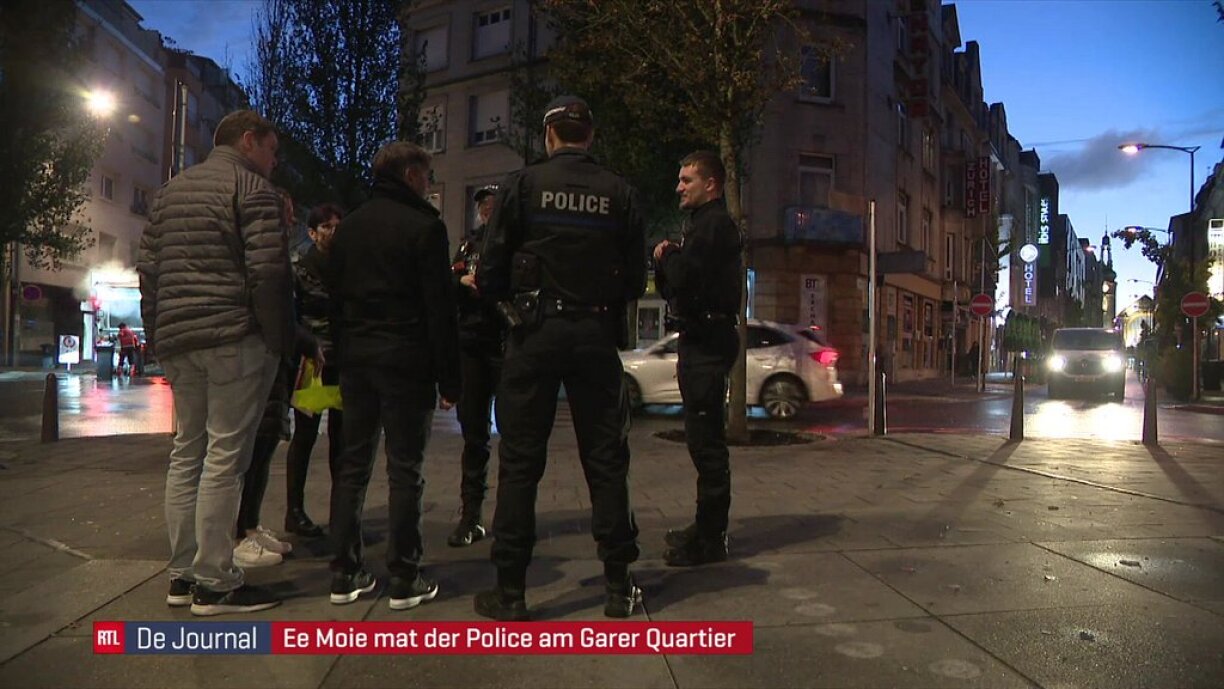
At 6am, a group of officers left the police station to patrol the Gare district. On their way, they crossed a number of homeless people still sleeping in the streets and about an equal amount of sleeping spots already deserted. Their path eventually took them past a school on Rue du Commerce where parents worry about the conditions that their children witness on their daily way to school.
Dr Jean-Marc Cloos, member of the local parents association, noted: “There are two to three prostitutes standing on Rue du Commerce, there is a sex shop in the next street, if you continue you find heavily intoxicated people who regularly draw interventions from police. Also, there are homeless people sleeping and asking for money nearby. To summarise, you have a scene of prostitution, drug consumption, alcoholism, and a sex shop surrounding the school. That is not ideal for children being taught.”
Many questionable activities in the Gare district already take place early in the morning. People do not seem to be disturbed by the presence of police nor cameras, which raises the frustration levels of officers working in the area. Police think that they do not have enough staff members or the legal means to handle the situation.
Pascal Ricquier, president of the National Syndicate of the Grand Ducal Police (SNPGL), argues that politicians should stand in for a stronger rule of law: “We believe that it should be possible to crack down on intruders for a couple of months. There should be a force only tasked with this job. Of course, everybody has to play along, including the prosecutor’s office, otherwise we cannot get on top of things. I think if Luxembourg continues to observe instead of acting, we will be overwhelmed.”
Ricquier acknowledged that not all of the issues in the Gare district can be lumped together and that repressive measures are no magic solution. Homeless people in particular need support.
After accompanying police officers during one of their shifts, our colleagues from RTL spoke to politicians from Luxembourg City’s opposition parties. And, the solutions proposed by the Greens, the Alternative Democratic Reform Party (ADR), the Left, and the Luxembourg Socialist Workers’ Party (LSAP), are very different at times.
One thing that most agree on is that the area around Rue de Strasbourg, Rue du Fort Wedell, and Rue du Commerce is having a drug-related crime problem. Nevertheless, few believe that the police can get on top of the situation without exterior help.
The Greens thus plead for more decentralised structures and criticise the strategy employed by the municipal council, as well as parts of the authorities. Councillor François Benoy commented: “We need to get people off the streets, which means we need ‘housing-first opportunities’. ... The municipality of Luxembourg City could do more, same as the Minister for Family Affairs and Integration.”
LSAP representatives advocate for an all-round approach that revitalises the capital’s contended district. However, gentrification is not the final solution, said councillor Gabriel Boisante: “If we only focus on gentrification, where will the less-qualified people live? Are we going to push them further out to a different municipality?”
The Left’s councillor Ana Correia da Vega argued that the repressive drug policies of recent years led to little success in the past 100 years: “We plead for liberalisation and decriminalisation of drugs, the City has to take more responsibility. There have to be different mechanisms regulating where and when drugs are consumed. The government should take responsibility rather than leave it up to the black market.”
The ADR’s councillor Roy Reding is in favour of prevention, but thinks that increased police presence is needed to achieve this goal: “The ADR highly welcomes the municipality’s initiative of hiring a private security firm, although it is actually a sad state of affairs.”
It remains clear that people have different views on how to tackle the issue. Next year’s election campaign will certainly reveal in whose ideas people have faith.